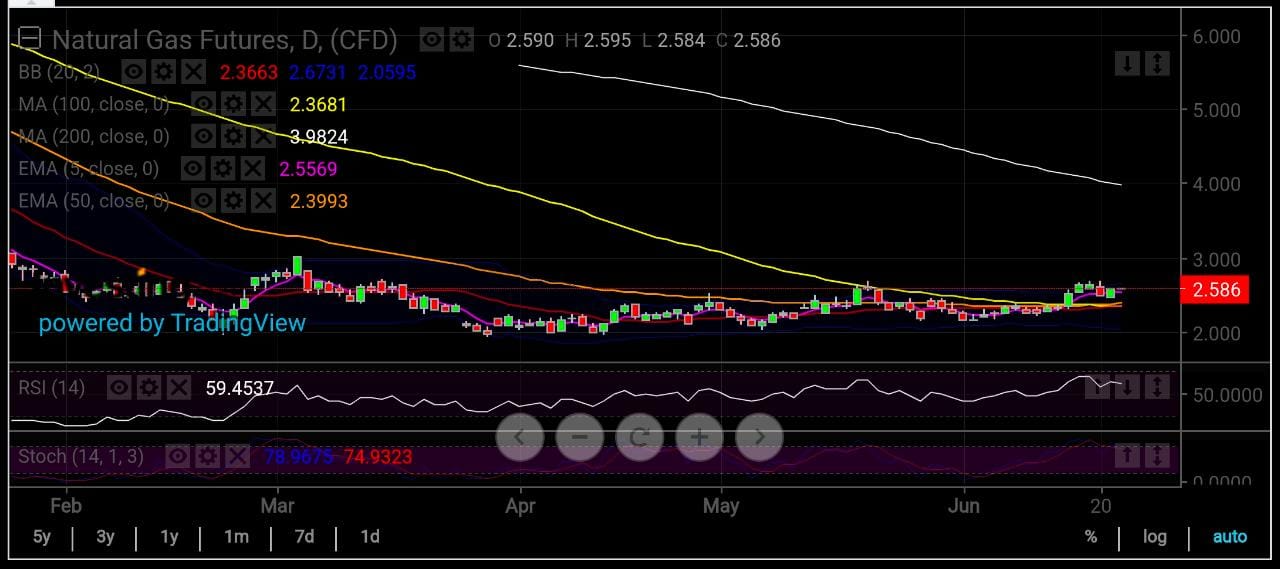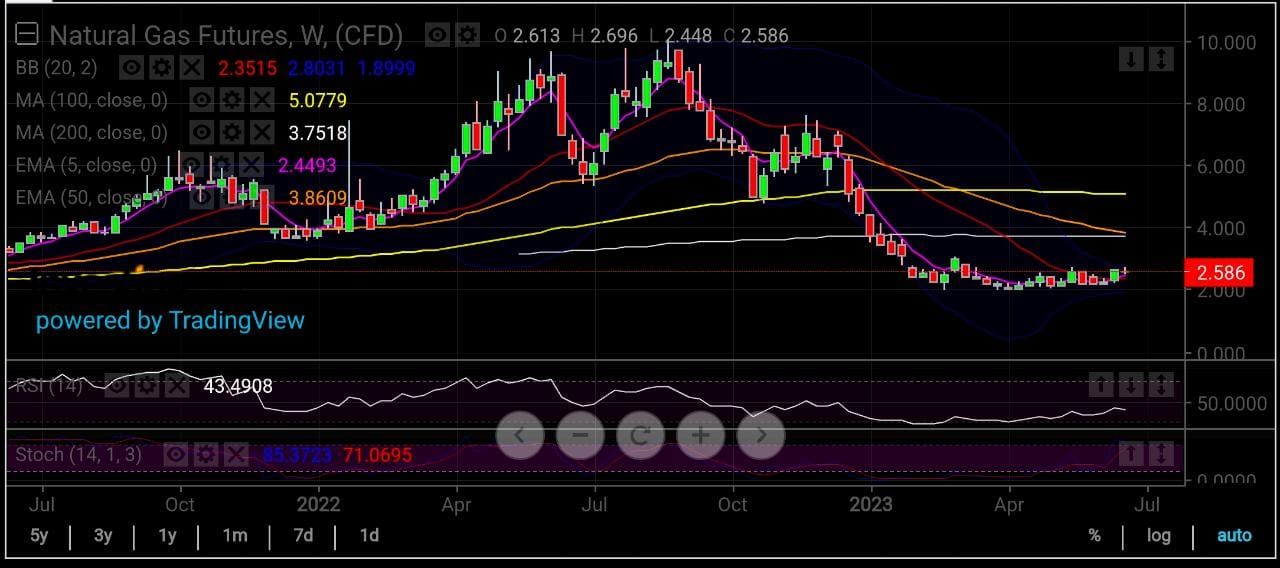- Texas could lead summer cooling demand as Lower 48 weather underwhelms
- U.S. power burns improving, helped by drop in LNG feed demand
- June proving best month for gas since August, up nearly 15%
- Technicals show $3 as a target for gas if $2.70 resistance firmly cleared
Natural gas bulls: Load and lock your bets on Texas.
The Lone Star State could carry much of the start of this summer’s cooling demand as temperatures in the rest of the U.S. Lower 48 continue to underwhelm for a while.
Says John Sodergreen, who writes a weekly note on natural gas from what he calls “The Desk”:
“A month ago we had all assumed we’d be smack dab in the middle of a Lower 48 above-average heat range. No such luck, except for Texas, maybe.”
“Summer arrived in the Lone Star state with a vengeance recently, and won’t likely be looking back for many, many moons. As for the big, populated areas of this great country of ours, well, normal is as extreme as it gets for another week or more. Except Texas.”
Sodergreen adds that July pointed to normal temperatures across the Lower 48 but, again, “not Texas.”
He said,
“The question on everybody’s mind is will the Texas blast furnace manage to single-handedly placate the trade until the real heat shows up everywhere else? Seems like it,”
 More anecdotal information points to why gas bulls should be paying more attention to Texas.
More anecdotal information points to why gas bulls should be paying more attention to Texas.
Mickey Shuman, a senior meteorologist with Atmospheric G2, says a strong subtropical ridge or “heat dome” is expected to build over Texas and the south-central U.S. this weekend into much of next week.
The ridge could support a prolonged stretch of hot, humid weather in Texas, including the likelihood of triple-digit heat in Dallas, Austin, San Antonio, and Houston, Shuman says.
Hot temperatures and high heat indices are also likely to generate strong cooling demand and near-all-time record power loads for the ERCOT grid in Texas, which provides electricity to more than 26 million customers.
Steven Silver, a senior meteorologist for Maxar, says that the record hot conditions in Texas this week contrast wildly to a pair of deep troughs bringing unseasonably cool conditions to the West and the South and East along with some very heavy rain in the Southeast and mid-Atlantic.
While the 6- to 10-day period features continued triple-digit heat in Texas, temperatures are just briefly above normal in the East early ahead of a cold front, which is then followed by another round of below-normal temperatures in its wake.
The ridge responsible for the Texas heat is expected to gradually drift westward, allowing for a significant warmup in the region.
Heat remains based from Texas to the West in the 11- to 15-day period, while near-normal temperatures encompass the eastern half of the U.S.
The eastern half of the U.S. remains near or slightly cooler than average, albeit with high humidity. The official forecast is not as warm as the models because of a warm historical bias.
Meanwhile, in much of the East, the north-central U.S. and parts of the West are expected to be slightly cooler than average. Tropical Storm Bret has formed in the central Atlantic and will likely be followed by another storm, but neither is expected to impact the U.S.
The large-scale pattern is now expected to retrogress by early July, shifting summer heat into the western half of the United States, including anomalous triple-digit, pre-monsoon heat in the desert Southwest.
Power Burns Spike as LNG Feed Declines
U.S. power burn demand has, meanwhile, tracked in the upper 30 bcf per day range, even reaching as high as 40.5 bcf/d on gas day June 15, putting current burns roughly 10 bcf/d higher than where they were sitting in the second half of May 2023, Platts says.
Liquefied natural gas, or LNG, seems to be a big contributor to this.
Platts noted that despite the relative scale of LNG feed gas demand losses in recent weeks, “the market has so far managed to absorb this freed-up supply by consuming it instead for power generation.”
LNG feed-demand losses have come on the back of maintenance works in the industry, which isn’t going away anytime soon.
The timing of the LNG facility outages has been coincident with a notable ramp-up in warm weather-driven power burn gains, which have more than offset the roughly 3 bcf per day of reduced LNG feed gas this month relative to April 2023 levels.
For the summer cooling season, burns are forecast to average approximately 37.2 bcf/d in 2023 or roughly 1.2 bcf/d above the 2022 summer average for power burn.
Amid the variance in weather forecasts and power burns, storage projections have been distorted too.
The storage build of 84 billion cubic feet from two weeks ago that beat forecasts for a 96-bcf injection would have typically been read as higher gas burns outright for power and cooling by utilities.
Only there was nothing typical about it as the U.S. Energy Information Administration, or EIA, did a major reclassification of gas in storage for the week ended June 9. That meant inventories were reduced on paper without as many burns.
For the latest week ended June 16, the EIA is expected to report a bigger-than-normal 91 bcf to storage last week as mild weather tamped down air-conditioning demand, according to a Reuters poll of industry analysts published Wednesday.
That build would compare with a 76 bcf injection during the same week a year ago and a five-year (2018-2022) average increase of 86 bcf.
The forecast for the week ended June 16 would lift stockpiles to 2.725 trillion cubic feet, or tcf — some 26% above the same week a year ago and about 15% above the five-year average.
Houston-based energy markets advisory Gelber & Associates said in a note to its clients in natural gas:
“After last week’s surprise storage injection on the bullish end of the spectrum, market participants are again shifting expectations to a more cautious outlook. Fear of another rally from storage is fresh in the minds of these participants and as heat begins to materialize, storage injections are likely to temper going forward.”
Weather, Gas Storage Remain Wild Card
Sodergreen of The Desk said he could not recall a June with such variability and volatility while tracking what he called a “jumble of fundamentals.” He adds:
“With a little luck the real heat that emerges everywhere in about a week should easily clear the decks of all the other noise we hear.”
The variability in both weather and storage has led to caution becoming a new watchword in natural gas — caution against the lows, that is.
With a near 15% gain for June, gas futures on the New York Mercantile Exchange’s Henry Hub are headed for their best performance since August — the month they hit a 14-year high of $10 per mmBtu or million metric British thermal units.
While summer weather hasn’t hit its typical baking point across the country, cooling demand is inching up slowly — sparking the realization in the trade that higher price lows might be more common from here than new bottoms.  The lowest Henry Hub’s front-month got to this week was $2.448, versus the $2.136 bottom seen at the start of June.
The lowest Henry Hub’s front-month got to this week was $2.448, versus the $2.136 bottom seen at the start of June.
The upward momentum could help gas bulls clear the $2.70 resistance to come within striking range of the key $3 level, said Sunil Kumar Dixit, chief technical strategist at SKCharting.com.
“A sustained break above $2.685 will target $2.78, followed by $3,” said Dixit, adding that major targets thereafter would be the Simple Moving Averages of the 100-month level of $3.25 and the 200-week level of $3.75.
“But if we fall back, then major support areas will be $2.40-$2.35 initially, followed by $2.13.”
***
As part of the InvestingPro Summer Sale, you can now enjoy incredible discounts on our subscription plans for a limited time:
- Monthly: Save 20% and gain the flexibility to invest on a month-to-month basis.
- Yearly: Save a jaw-dropping 50% and secure your financial future with a full year of InvestingPro at an unbeatable price.
- Bi-Yearly: Save an astonishing 52% and maximize your returns with our exclusive web offer.
Don't miss out on this limited-time opportunity to access cutting-edge tools, real-time market analysis, and expert insights. Join InvestingPro today and unlock your investing potential. Hurry, the Summer Sale won't last forever!

Disclaimer: The content of this article is purely to educate and inform and does not in any way represent an inducement or recommendation to buy or sell any commodity or its related securities. The author Barani Krishnan does not hold a position in the commodities and securities he writes about. He typically uses a range of views outside his own to bring diversity to his analysis of any market. For neutrality, he sometimes presents contrarian views and market variables.
